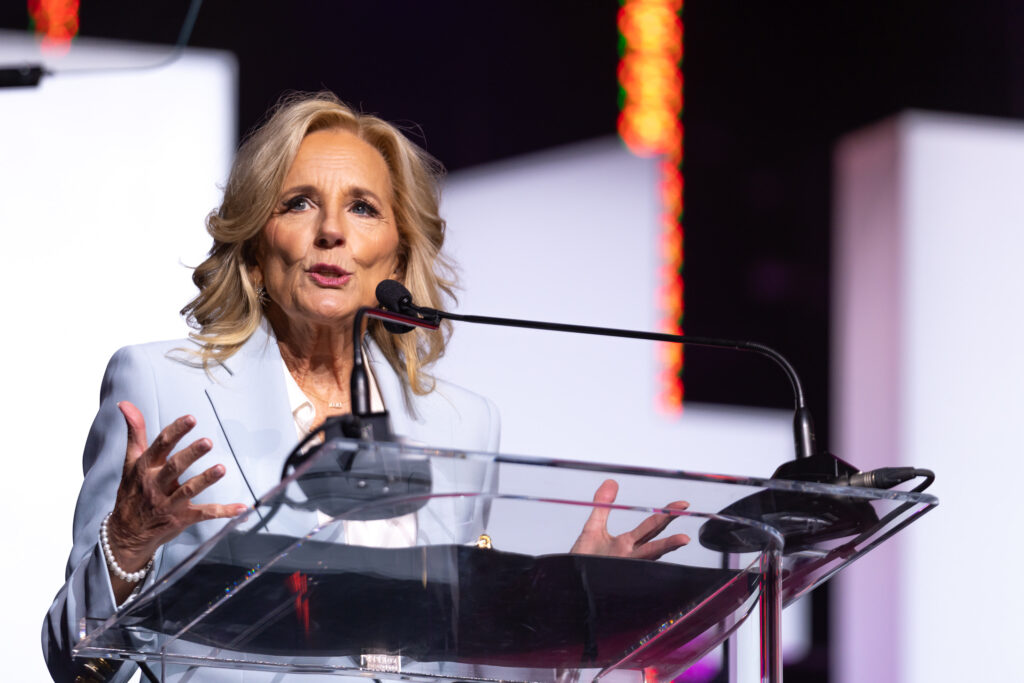
The Advanced Research Projects Agency for Health (ARPA-H) has committed $110 million to 23 awardees addressing women’s health, First Lady Jill Biden announced Wednesday at the HLTH 2024 conference in Las Vegas.
The funding is part of a program called Sprint for Women’s Health, which is organized by ARPA-H, an agency within HHS, and was first announced in February. It came after the White House launched an initiative on women’s health research in November.
The awardees include startups, “global innovators” and universities and are addressing cancer, ovarian health, gynecological care, endometriosis, obstetrics, menopause, lymphatics, pain management, neurological conditions and cardiovascular conditions, according to the announcement. For example, biotech company Gameto was selected to build a novel ovarian therapy to stop disease in menopause, and Vanderbilt University Medical Center was chosen to create an at-home medication for risks during preterm labor. The recipients were chosen based on “their high-impact and novel approaches,” the announcement stated.

NEMT Partner Guide: Why Payers and Providers Should Choose MediDrive’s TMS
Alan Murray on improving access for medical transportation.
“ARPA-H is de-risking investments in these big ideas, so that answers can get to the women who need them now,” Biden said. “The potential in this space is too great to ignore. In 2021, the Boston Consulting Group estimated that the size of the women’s health market would grow from $9 billion to $29 billion in just eight years, because of the growing momentum from funders and founders to address the unmet health needs of women. I know you see these opportunities in your day-to-day work.”
The awardees are also split up between two tracks: Spark and Launchpad. The former is for early-stage research, while the latter track is for later-stage development that will bring new treatments and products to market within two years.
In total, ARPA-H received more than 1,700 submissions for funding across 45 states and the District of Columbia and 34 countries. About 30% of the recipients have never received government funding and 39% have fewer than 50 employees, according to the announcement. In addition, 70% of the awardees are women-led.
During a panel discussion at HLTH, Renee Wegrzyn, Ph.D., ARPA-H director, noted that the 1,700 applications represent more than $8 billion of applications.

Solera Health’s Playbook To Beat Rising Employer Expenses
Solera Health is working to streamline employer contracting with health tech.
“There’s a lot out there that is still left to be invested in,” Wegrzyn said. “There’s a lot of momentum there.”
Although women represent about half of the population, women have historically been underrepresented in research. It wasn’t until 1993 when the U.S. Congress passed a law that required women to be included in NIH-sponsored clinical trials. During her speech, Biden argued that because of a lack of investment in women’s health research, many medications, treatments and health products are based on men.
Biden also called on the audience to take action to further advance the women’s health space.
“Any time I get together with my sisters and friends, we have conversations about our health,” she said. “We ask each other: should I be taking hormone therapy for symptoms related to menopause? How is it possible that my heart attack was almost missed?
“It’s time for investors, researchers, and business leaders to have those conversations too, not as an afterthought but as a first thought,” she urged. “Those kinds of questions belong in your research proposals, in your laboratories, in your pitch decks. There is incredible momentum behind women’s health right now. What are you going to do to make sure this energy is unstoppable?”
Photo: HLTH






